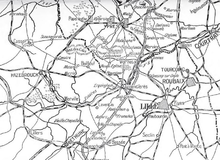Battle of Givenchy
| Winter operations 1914–1915 | |||||||
|---|---|---|---|---|---|---|---|
| Part of Western Front of World War I | |||||||
 West Flanders 1914–1915 |
|||||||
|
|||||||
| Belligerents | |||||||
|
|
|||||||
| Commanders and leaders | |||||||
| Douglas Haig | Crown Prince Rupprecht | ||||||
Winter operations 1914–1915 is the name given to military operations during the First World War from 23 November 1914 – 6 February 1915, on the part of the Western Front held by the British Expeditionary Force (BEF), in French and Belgian Flanders. Both sides had tried to advance in Flanders after the northern flank had disappeared during the Race to the Sea in late 1914. Franco-British attacks towards Lille in October were followed by attacks by the BEF, Belgians and a new French Eighth Army (Général Victor d'Urbal). A German offensive began on 21 October but the 4th Army (Generaloberst Albrecht, Duke of Württemberg) and 6th Army (Generaloberst Rupprecht, Crown Prince of Bavaria) were only able to take small amounts of ground, at great cost to both sides, at the Battle of the Yser (16–31 October) and further south in the First Battle of Ypres (19 October – 22 November).
By 8 November, the Germans realised that the advance along the coast had failed and that taking Ypres was impossible. Attacks by both sides had quickly been defeated and the opposing armies had improvised field defences, against which attacks were repulsed with many casualties. By the end of the First Battle of Ypres in November 1914, both sides were exhausted, short of ammunition and suffering from collapses in morale; some infantry units refused orders. The mutual defeat of the First Battle of Flanders was followed by trench warfare, in which both sides tried to improve their positions as far as the winter weather, mutual exhaustion and chronic equipment and ammunition shortages allowed.
...
Wikipedia
